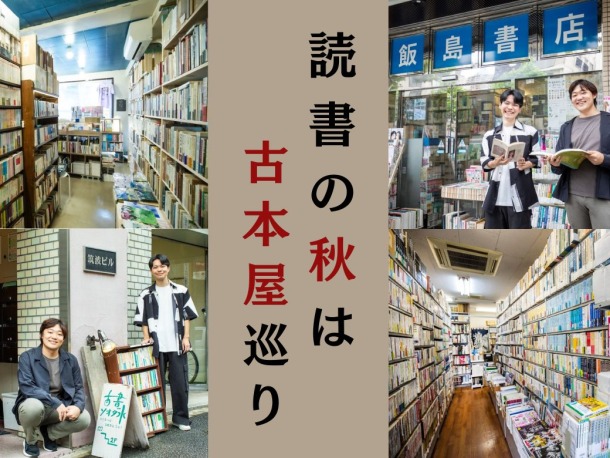
The area around Waseda University is one of the leading second-hand bookstore districts in Japan, with over 30 second-hand bookstores. Each store has its own unique lineup, with old books piled up in a small space or displayed like an antique shop, and each store has a different atmosphere. This time, we asked two students who love second-hand books to represent Waseda University students to talk about the appeal of second-hand books. We will also take a look at the deep world of second-hand bookstores, touring two stores that the two students often visit: Iijima Bookstore, a long-established store that has been in Waseda for several decades, and Kosho Sodasui, which has been in business for six years. Why not go on a second-hand bookstore tour to find your favorite book in the autumn of reading?
INDEX
Now, let's enter the world of used books!
▼ A Waseda University student who loves used books talks
Let's go to second-hand bookstores
▼Iijima Bookstore
▼Kosho Sodasui
▼Find your favorite book!
Now, let's enter the world of secondhand books!
A Waseda University student who loves secondhand books talks
This time, we will be navigating the second-hand bookstores around Waseda University, with Sawai, a third-year student in School of Social Sciences, and Kashima, a fourth-year student in School of Culture, Media and Society. Both are members of the university's official literary student club, Shubunkai, and their hobby is visiting secondhand bookstores. "We love secondhand books so much that our house is full of them," they say. What is the appeal of secondhand books? We asked them to tell us about their favorite books out of the many secondhand books available.
By chance, I found a used secondhand book that told a story.
Takashi Sawai, 3rd year School of Social Sciences
Ryusei Kashima, 4th year student School of Culture, Media and Society
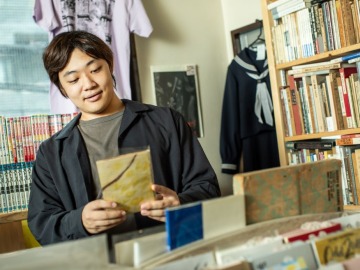
When Sawai was a high school student, there was a secondhand bookstore on the way to school, so he started going to used book events and the used bookstore district of Jimbocho.
Sawai: The fun of secondhand books is that I may never come across them again. Wanting to experience the moment when I accidentally find a book that I will never be able to get again, I visit many secondhand bookstores and participate in events where rare books are sold.
For example, "Environment and Design," published in 1971, is a secondhand book that I came across by chance. I was surprised when I found a book with its box, which is no longer on sale, being sold for one-sixth the price of a new copy! The secondhand book I buy are treasures, so just having them in my hands is valuable to me, and I keep them carefully after reading them.
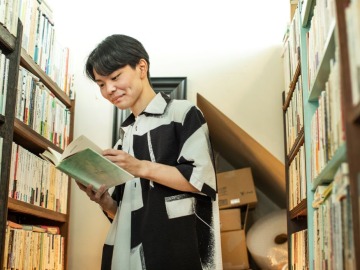
Kashima says that Waseda has many secondhand book cheaply, so he started visiting secondhand book when he was a freshman.
Kashima: The good thing about used books is that they still have traces of their previous owners. Some used book stores sell them with not only notes and creases, but also bookmarks and movie tickets still in place. When I find a seocndhand book with multiple layers of traces of someone having read it, it's interesting to feel the story of how it came into my hands.
I love Mieko Kanai's "The Sea Without Shores," and I felt something was fateful about this bookmark with a rabbit illustration in it, so I bought it. In an essay, Kanai writes that she "folds the corners of the book as a bookmark," and there are traces of the corners being folded, which may have been in imitation of her example. I'm reading this book while imagining why the page was folded.
Photo on the left: "Environment and Design" by Garrett Ekubo (SD Sensho)
Photo on the right: "Shoreless Sea" by Kanai Mieko (Kawade Bunko). Kashima reads while sticking sticky notes on parts that made an impression on he or that he would like to quote someday. "Rather than just skimming through, I use sticky notes as a physical medium to directly engage with the words written," says Kashima.
Let's go to secondhand bookstores
Iijima Bookstore
Discover a new book that suits your taste from the unique bookshelves
The first place we visited was Iijima Bookstore, located near the shopping street at the west gate of Waseda Campus. It opened in 1970. The store moved from near Meiji Street to its current location about 20 years ago, and is run by the owner Iijima Yoshihisa and his son Yoshiki. Iijima Yoshihisa, who opens the store every day, is an astounding 88 years old, making him the oldest owner of a second-hand bookstore around the university. When the store first opened, secondhand bookstores were just starting to gather in Waseda, and there were many students and the rent was reasonable, so they decided to set up shop here. This time, we spoke to Iijima Yoshiki, the second-generation owner who is currently in charge of selling second-hand books online and setting up stalls at second-hand book events, about the characteristics of the store.

At Iijima Bookstore. From left: Sawai-san, the first store owner Yoshihisa-san, and Kashima-san
Kashima: What genres does Iijima Bookstore focus on?
Iijima: We stock a wide range of books, from literature and entertainment to practical books that are fun to read and useful. In order to spark customers' interest, we try to display popular and newly arrived books on the shelves as much as possible. It would be boring if the same books were always lined up in the store. Also, even if customers are interested and pick up a book, they won't buy it if it's expensive, so we price it so that even students can afford it. By doing so, we hope to encourage students who think that "new books are too expensive for me" to become more familiar with reading.
Sawai: Thank you! Secondhand bookstores have a tendency to display their individuality in the way they arrange their shelves. Is there anything you do with this in mind?
Iijima: I try to arrange books by authors that I found interesting together. For example, Seicho Matsumoto's mystery novels published between the 1950s and 1990s are still interesting to read today, and I think they have influenced recent mystery novels. I want students to read such influential masterpieces. Also, I sometimes put books I buy from the same person in a set and put them on the same shelf at first. Even if they seem to be from different genres at first glance, the shelf can resonate with people who have the same tastes as the previous owner.
Kashima: The shelves at Iijima Bookstore reflect the tastes and preferences of many different people.
Iijima: That's right. When you browse the shelves of secondhand book, you're sure to find secondhand book that interest you other than the one you were looking for. We live in an age where you can buy books online, but that's exactly why I want people to try looking for books at secondhand book.
Left: A wagon selling books at the bargain price of 100 yen for two books, hoping that "students will become interested in books." "It's a service," says Yoshiki.
Photo on the right: A shelf lined with books by Seicho Matsumoto
Sawai
I'm studying engineering, so I'm happy that they have books on engineering and science. In fact, I bought my favorite, "Environment and Design," at Iijima Bookstore. I think the magazine section is unique to Iijima Bookstore.
Kosho Sodasui
Spend time with books in a relaxed atmosphere
Next up is Kosho Sodasui, located on the second floor of the building to the right as soon as you exit the north gate of Waseda Campus. It is a newcomer that opened in 2018. Waseda students can be seen stepping inside, attracted by the lineup of uniform shelves installed next to the exterior sign. The store is filled with second-hand books, and original goods such as stickers and T-shirts are also lined up so that even those who are not familiar with second-hand bookstores can enjoy their time there. What is the unique attention to detail that owner Higuchi Kai has paid to creating this store?
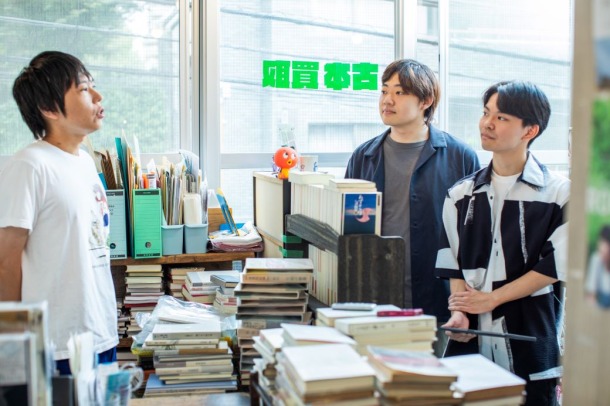
Inside the second-hand book store Sodasui. From left: Higuchi, Sawai, and Kashima
Kashima: Do you have any particular preferences for the genres you put on your shelves?
Higuchi: Nothing in particular, I just display all the books I bought. I don't have any recommended shelves because I want people to look at all the shelves as freely as possible. However, I arrange my favorite poetry shelves in a way that I won't be embarrassed to display anywhere, for example by grouping poets who were active in the same generation. I hope that people who see the shelves might think, "I've never been interested in poetry before, but maybe I'll give it a read."
Sawai: You also sell zines* on the magazine rack in the center of the store!
Higuchi: That's right. In reality, zines don't sell well in our store, and we don't make much profit from them. But selling books isn't just about making a profit, is it? From the customer's perspective, we stock zines because we think they would be happy to buy ones that aren't sold anywhere else.
Sawai: Many Waseda University students come to look for books that can only be found at this used bookstore, such as poetry and zines. How would you like people to use the store?
Higuchi: I hope that students will use it as a place to kill time during their free time in class. It's not that my experience at secondhand book will be useful, but life is more fun with more useless things. It's a characteristic of Waseda that there are so many used secondhand book around the university, and I think it's a valuable thing, so I hope that students will make full use of it during their time as students. Of course, I hope that students will continue to sell and buy books after they graduate.
(*) A booklet produced independently by an individual or group and published in small quantities.
Left: Inside the store. Higuchi's favorite music is played, allowing you to relax and enjoy your time. Some of the bookshelves are handmade by Higuchi.
Right: Signboard and uniform shelves on the road in front of the store
Kashima
I often stop by the used bookstore Sodasui on my way to and from the library. They have a wide selection of poetry, as well as used humanities books and specialized books. The foreign literature section is also recommended!
Find your favorite book!
Discover your interests at secondhand book and open the door to a new world
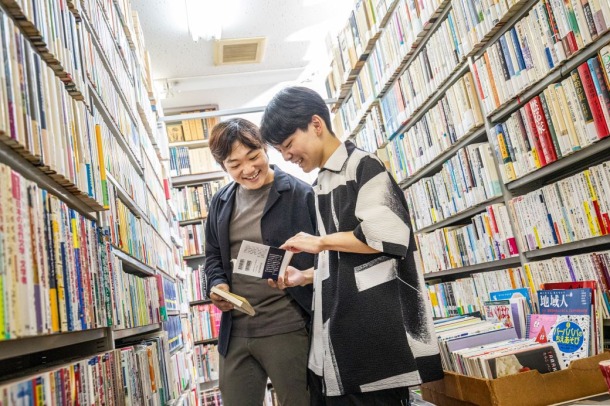
At Iijima Bookstore. Kashima-san has so many secondhand book piled up in his room that the floor is cracking.
Even though they are all called secondhand book, they all have different characteristics and preferences. It would be fun to visit several stores and learn about their differences. We asked the two of them how to use secondhand book to find your favorite book, which they would like to share with both those who have never been to secondhand book and those who love secondhand secondhand book.
Kashima: First, start by looking at the spines of the books lined up in a row. Secondhand bookstores are places where you can find books that aren't available at new bookstores or libraries. I think you can learn about a new world just by looking at the spines.
Sawai: For me, secondhand book are like a "compass of interest." When I look at the shelves there, the needle sometimes points in an unexpected direction, like "I'm interested in this genre." To do that, it's important to take the first step. If you don't have the courage, I think it's more fun to go with someone.
store information
<Iijima Bookstore>
[Address] 2-9-16 Nishi-Waseda, Shinjuku-ku, Tokyo
[TEL] 03-3203-2025
[Business hours] 10:00-18:00
【Closed】Sunday
<Kosho Sodasui>
[Address] Tsukuba Building 2A, 1-6-3 Nishi-Waseda, Shinjuku-ku, Tokyo
[TEL] 03-6265-9835
[Business hours] 11:00-20:00
[Closed] Wednesday
【Mail】[email protected]
[X] @kosho_soda_sui
Interview and text: Kaori Sasuga
Photography: Kota Nunokawa
[Next Focus Preview] "Reasonable Consideration" to be released on Monday, November 11th


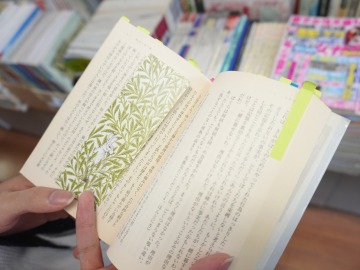
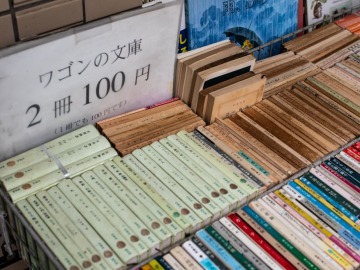
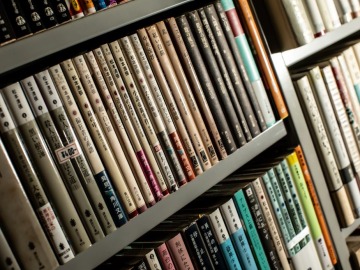
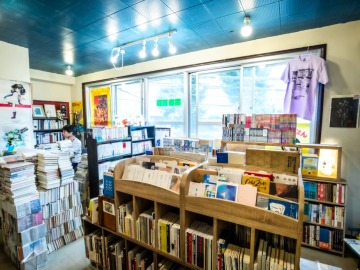
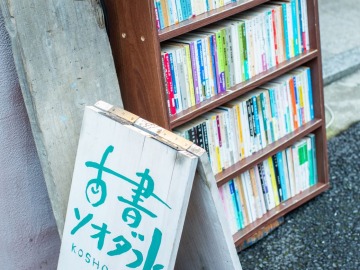
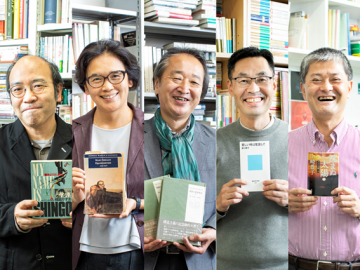

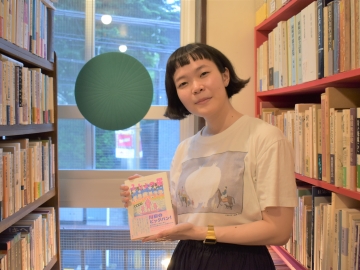
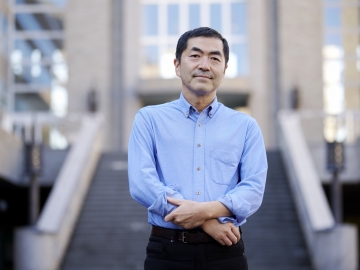

![[Save version] Map of the four main campuses](https://www.waseda.jp/inst/weekly/assets/uploads/2025/09/17cb2975123fc5103172ef60bd98608d-610x458.jpg)

